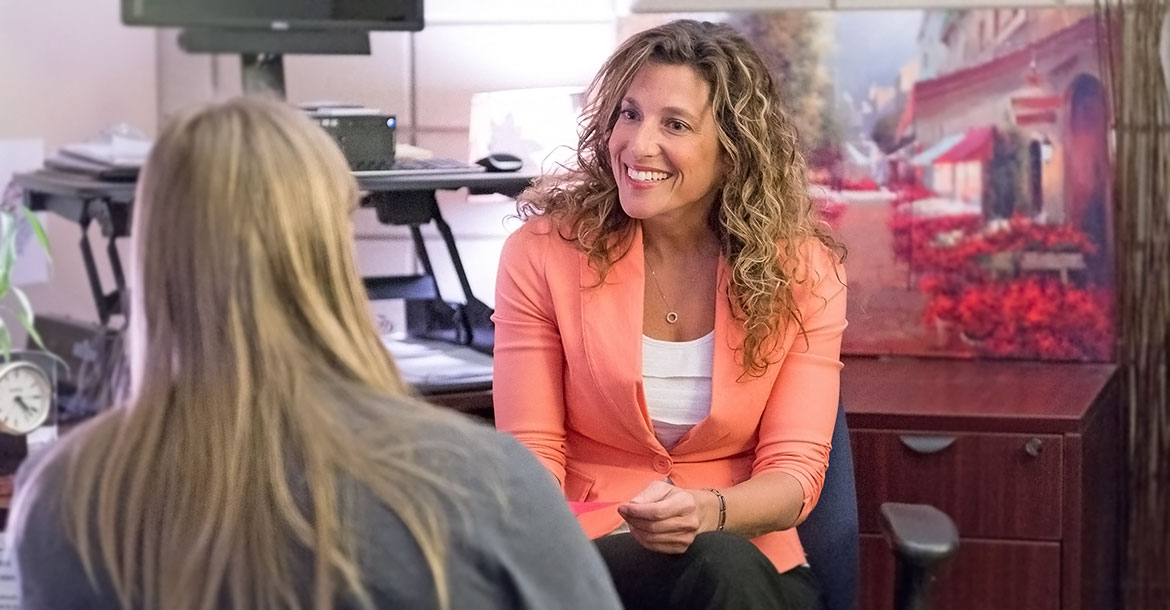Counselling & mental health
Counsellors provide a space for students to examine and explore behaviours, relationships, feelings, or thoughts which cause concern or challenges in their life. Whether these problems are primarily impacting personal, social, or academic life, a counsellor can help to strengthen a student’s ability to cope and provide a valuable source of support.
UBCO Counselling Services
To book an appointment with one of our counsellors, call 250 807 9270 or book an appointment online. In-person and virtual appointments available.
If you cannot find an appointment online, please CALL our front desk.
Cancelling an appointment
To avoid a $30 cancellation fee, please contact our office at least 24 hours in advance if you need to cancel your appointment.
Counselling office hours
Monday to Friday, 9 am to 4 pm*,with a lunch closure from 12:30 to 1:30pm
Closed for all statutory holidays and during the December holiday.
*Some evening appointments may be available by appointment only.
UBCO Psychology Clinic
Students can also access support through the Psychology Clinic on campus. The Psychology Clinic provides low-cost access to psychology services in a wide range of areas.
24/7 Counselling Services
The following resources are available if you need support after hours.
Here2Talk
Free, confidential counselling and community referral services in multiple languages, conveniently available 24/7 via app, phone and web.
Canada-wide toll free: 1 877 857 3397
Canada-wide direct: 604 642 5212
Access from outside Canada: +1 604 642 5212 (international calling charges may apply)
Crisis Centre BC
Offers immediate access to barrier-free, non-judgmental, confidential support through 24/7 phone lines and online services.
First Nations and Metis Hope for Wellness Helpline
Hope for Wellness Helpline is available 24/7 to all Indigenous people across Canada.
Other counselling resources
Third Space Life Charity: Student Care Program
Third Space offers supportive counselling in conjunction with the UBCSUO. Learn more about this at thirdspacecanada.org
24/7 Crisis lines
Interior Crisis Line: 1 888 353 2273
9-8-8 Suicide Crisis Helpline: 988 (call or text)
BC Suicide Prevention and Intervention Line: 1 800 784 2433
The UBCOSUO extended benefits include coverage for personal counselling. Many students may also have counselling coverage under their parents’ extended health benefits as well. If you wish to access a personal counsellor in the Central Okanagan, try this link: BCACC counsellors
How counselling helps
Counsellors can help you deal with a variety of issues that challenge your ability to be successful at university, including:

- struggling to keep up with your studies
- dealing with an emergency or a personal crisis
- having difficulty with relationships, friends or roommates
- wanting to improve your communication with others or becoming more comfortable speaking in class
- dealing with anxiety and stress
- experiencing panic, depression, or suicidal thoughts and feelings
- managing your time so that you “have a life besides school”
- having a friend who is having problems and you want to know how to help
- have addictions that are taking control of your life
- sexual concerns or difficulties with gender or self-identity
Stepped care counselling model
At UBC Okanagan, we offer a stepped care counselling model to best support our student population. The steps may include:
Step one
First counselling visit: determine needs, priority, and best resources for students to try.
Step two
Campus and personal self-care: Equip students with a range of community, campus, and online resources.
Step three
Groups and workshops: Guide students to available support groups and workshops to develop a peer support network.
Step four
Individual counselling: Provide appropriate resources to students needing individual counselling.
Frequently asked questions about the stepped care counselling model
What is stepped care?
What happens on the first visit?
What kind of resources are offered?
Do all students need one-on-one counselling?
Does this mean a lot of appointments?
Where can I find information on mental health resources in the Kelowna area?
What is stepped care?
Stepped care is designed for high-volume student care situations. If long-term or ongoing counselling is needed, particularly if students have pre-existing mental health concerns, counsellors will work with students to determine resources and options in the local community.
What happens on the first visit?
In your first visit with a counsellor, they will meet with you to clarify your current needs and/or goals. With your counsellor’s support, you will develop an individualized plan to improve your overall well-being.
What kind of resources are offered?
For some individuals, campus resources offered by professional and/or student staff may be beneficial; and in some cases, workshops and groups on campus may also be available to address individuals’ mental health needs. There are also a wide variety of web-based apps that are well established to aid in a variety of challenges.
Do all students need one-on-one counselling?
Research on student mental health suggests that diversity in care delivery (not just in-clinic one-on-one sessions) is highly effective in helping students achieve their goals.
Sometimes one-on-one support from a therapist or counsellor is the best fit for your needs and/or goals. If this is the case, individual counselling options in the community and on-campus are available and will be discussed to determine the best fit.
Does this mean a lot of appointments?
Not necessarily. If you feel your needs would be better met by more frequent, long-term counselling, Counselling Services will do its utmost to refer you to a counselling service that is right for you.
Where can I find information on mental health resources in the Kelowna area?
Refer to our list of community resources (PDF) to see what is available that may help you.
For more information on where to find a counsellor in Kelowna, visit BC Association of Clinical Counsellors (BCACC).
We work closely with the Student Support and Case Management team. You may also be connected with a member of their team.